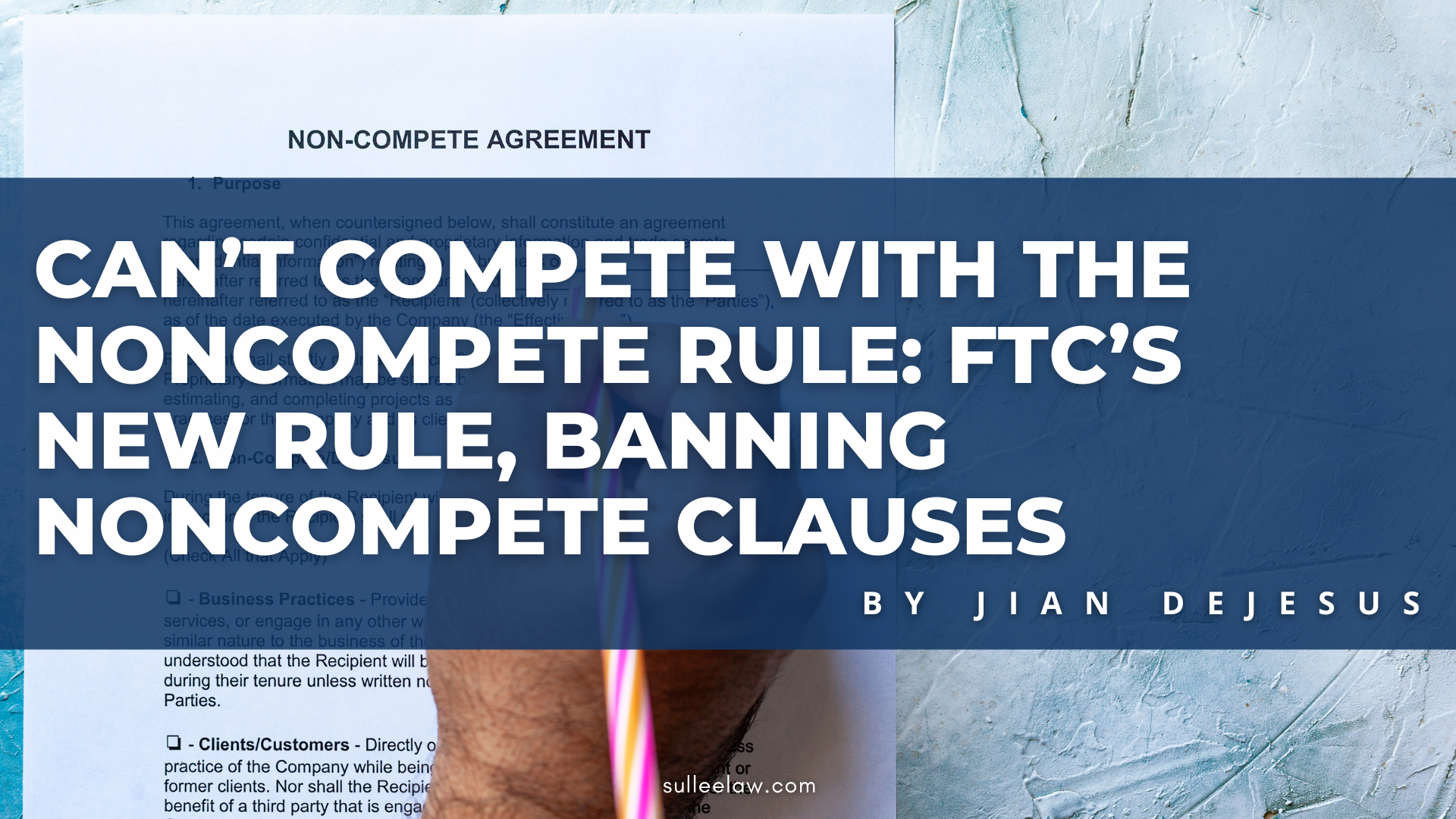What is a Non-Compete Clause?
If you ever come across an employment contract, you may typically find a provision that limits an employee “from working for a competing employer” or “starting a competing business” and restrains such competing acts within a “geographic area and period of time” following the end of an employment relationship. These types of provisions are what’s known as a “non-compete clause.” While non-competes may seem to restrict workers from seeking competing work, it may help employers protect confidential information.
Why is the FTC seeking to Ban Non-Compete Clauses?
In January 2023, the Federal Trade Commission (“FTC”) proposed a rule to ban the use of non-compete clauses. From the FTC’s perspective, non-competes violate fair trade laws and harm workers by decreasing competition, lowering wages, and preventing the formation of new businesses. As a result, workers are forced to remain in employment they wish to leave or incur “other significant harms and costs, such as” transferring to a lower-paying role, relocating, leaving the workforce, or defending against litigation.
In its final rule, issued in April 23, 2024, the FTC found that non-compete clauses are an “unfair method of competition,” thus violating Section 5 of the FTC Act. Under Section 5 of the FTC Act, an act is unfair when it “(1) causes or is likely to cause substantial injury to consumers, (2) cannot be reasonably avoided by consumers, and (3) is not outweighed by countervailing benefits to consumers or to competition.”
As a result, by banning employers from imposing non-competes on workers, the FTC estimates an increase in business formation by 2.7% per year (i.e., over 8,500 new businesses each year), an increase in wages “by an additional $524 per year,” a decrease in “health care costs by up to $194 billion over the next decade,” and an increase in innovation with “more patents each year.”
What are the Effects of the FTC’s Final Rule?
In April 23, 2024, the FTC issued a final rule as to banning the use of non-competition clauses. Below is a brief overview of the effects of the FTC’s final rule on the affected parties.
How does the rule affect workers?
Following the final rule’s effective date, employers can no longer enforce existing non-compete clauses against workers. Specifically, the final rule prevents “a person to enter into or attempt to enter into a non-compete clause; to enforce or attempt to enforce a non-compete clause; or to represent that the worker is subject to a non-compete clause.” Under the final rule, a “worker” includes an “employee, independent contractor, extern, intern, volunteer, apprentice, or a sole proprietor who provides a service to a person.”
Senior executives with existing non-compete clauses, however, are not impacted by the FTC’s final rule. This means that non-compete clauses currently in existence against a senior executive remain in force. The final rule defines “senior executives” as workers who (1) were in a policy-making position; and” (2) earned at least $151,164.
Specifically, regarding senior executives, the final rule prevents “a person to enter into or attempt to enter into a non-compete clause; to enforce or attempt to enforce a non-compete clause entered into after the effective date; or to represent that the senior executive is subject to a non-compete clause, where the non-compete clause was entered into after the effective date.” The FTC believes that senior executives are less likely to suffer the harms that other works are subjected to, as well as other practical concerns raised by commenters to the rule.
Moreover, the final rule does not apply to a bona fide sale of a business entity or to causes of action regarding a non-compete that “accrued prior to the effective date.” The final rule further finds that “[i]t is not an unfair method of competition to enforce” or “make representations about a non-compete clause” where a person has a good-faith belief that the final rule is inapplicable.
How does the rule affect employers?
As mentioned above, employers are prevented from entering into a non-compete clause with workers and senior executives and cannot enforce existing non-competes against workers (and for senior executives for non-compete clauses entered into after the effective date).
Regarding existing non-compete clauses, employers are further required to provide workers with notice that the non-competes are no longer enforceable. Under Section 910.2(b)(4), the FTC provides model language for employers to satisfy the notice requirement, as follows:
A new rule enforced by the Federal Trade Commission makes it unlawful for us to enforce a non-compete clause. As of [DATE EMPLOYER CHOOSES BUT NO LATER THAN EFFECTIVE DATE OF THE FINAL RULE], [EMPLOYER NAME] will not enforce any non-compete clauses against you. This means that as of [DATE EMPLOYER CHOOSES BUT NO LATER THAN EFFECTIVE DATE OF THE FINAL RULE]:
- You may seek or accept a job with any company or any person—even if they compete with [EMPLOYER NAME].
- You may run your own business—even if it competes with [EMPLOYER NAME].
- You may compete with [EMPLOYER NAME] following your employment with [EMPLOYER NAME].
The FTC’s new rule does not affect any other terms or conditions of your employment. For more information about the rule, visit [link to final rule landing page]. Complete and accurate translations of the notice in certain languages other than English, including Spanish, Chinese, Arabic, Vietnamese, Tagalog, and Korean, are available at [URL on FTC’s website].
When will the rule go into effect?
The final rule is to go into effect 120 days after it is published in the Federal Register. Publication of the final rule is currently scheduled for May 7, 2024; therefore, the effective date is likely to be September 4, 2024.
For more information, please visit the Federal Trade Commission’s website regarding the Noncompete Rule: https://www.ftc.gov/legal-library/browse/rules/noncompete-rule.

